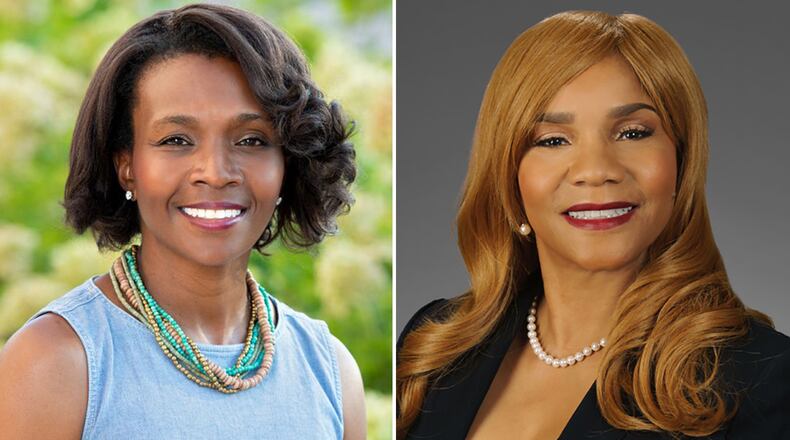Cobb County candidates are facing off in the May primary for top posts in county government: county chair, two district commissioners, district attorney and sheriff.
Incumbent Chairwoman Lisa Cupid faces primary challenger Shelia Edwards, who ran unsuccessfully for District 4 in 2020.
During a candidate forum hosted by the Cobb Democracy Center, Edwards voiced her opposition to several of Cupid’s policy proposals, including the proposed stormwater fee the board of commissioners postponed earlier this year, the proposed 30-year penny sales tax for transit expansion, and increased spending in the county budget.
“I think the county needs to tighten its belt before it asks the community to do more,” Edwards said. “We have to come up with a plan so that we don’t turn around each and every situation and tell the taxpayer to pay for it.”
Cupid said county departments haven’t even reached pre-recession funding levels, leaving the county underfunded and unable to properly invest in the county’s services and infrastructure.
“Our spending has not met the need,” Cupid said. “Our citizens have not expected less, even though they want us to do more with less.
“We do not make gold out of straw.”
Because current Commissioner Jerica Richardson is running for U.S. Congress in the 6th District, the Commission District 2 spot is up for grabs, with five Democrats facing off in the primary: former state Rep. Erick Allen, former Cobb school board member Jaha Howard, community advocate Kevin Redmon, law firm executive assistant Taniesha Whorton, and William Costa, who works in food and beverage manufacturing.
In the District 2 candidate forum, Allen, Howard, Redmon and Whorton all said they support for the 30-year mobility Special Purpose Local Option Sales Tax to expand transit in the county but were somewhat divided over the county commission’s district map — an ongoing legal dispute that also directly impacts the District 2 race.
The county has been operating under a map passed by the commission in a novel move using its home rule powers to override state lawmakers who drew Richardson out of her district and drastically changed the shape of District 2. That prompted a lawsuit that was dismissed this month by the Georgia Supreme Court. Justices did not weigh in on whether the county’s unprecedented legal maneuver is constitutional, but pointed out that the county “has a substantial risk of losing.”
Allen was the chair of the Cobb delegation when Republican lawmakers drew Richardson out of her district in 2022. But he broke apart from the other Democrats to say the county should have taken other steps to remedy the situation instead of passing its own map.
“This was the legislature targeting Commissioner Richardson, full stop. However, we have to be careful with matching one unprecedented act with another,” Allen said. “It’s a very, very complicated issue. But home rule is creating chaos, not solving the clarity problem.”
One potential candidate in the District 2 race, Alicia Adams, tried to run but was disqualified by the Board of Elections because she does not live in the district under the current county map. Her lawsuit, which is pending in Cobb Superior Court, alleges that the map is unconstitutional.
Qualifying was held under the current county-passed map. Under the state-passed map, Redmon and Costa would not live in District 2. It is unclear what would happen if the map is ruled unconstitutional in court in the midst of the election.
Commissioner Monique Sheffield in south Cobb’s District 4 faces Yashica Marshall, an attorney who also ran unsuccessfully for Mableton City Council last year.
Marshall said she, too, disagreed with the county’s decision to draw its own map. And while she does support expanding transit in Cobb County, she does not think a 30-year M-SPLOST is the way to pay for it.
“I don’t think you need to add a new tax,” Marshall said. “I think it’s just more so about ensuring that the budgeting process is done appropriately, and I don’t think that’s what’s been happening.”
Sheffield pointed out that the M-SPLOST would cover the current transportation budget and shore up those funds while helping address the problems caused by the county’s rapid growth.
“Cobb County currently has 785,000, and we are expected to grow to nearly 1 million people in just two decades,” Sheffield said. The proposed projects “include various options that will benefit the diverse community in Cobb County.”
Incumbent District Attorney Flynn Broady will face Sonya Allen, a deputy DA in the Fulton County DA’s office. During a candidate forum, both candidates said they support “restorative justice,” which is designed to allow nonviolent criminal offenders enter rehabilitative programs in lieu of traditional sentencing.
Allen criticized Broady’s decision not to retry Justin Ross Harris for murder in the death of his young son, who died after being left in a hot car. Harris’ 2016 conviction was overturned by the Georgia Supreme Court last year. Allen said the decision was what led her to run for the DA position.
“If a little boy can’t get justice, then who can?” she said.
Broady defended the decision and cited Supreme Court’s ruling, which limited the evidence that could be used to retry to case.
“It was evidence that old prosecutors had put in place to try to overcharge someone to make sure they got a conviction,” Broady said. “That’s not the way I work. We do things ethically.”
Sheriff Craig Owens faces one primary challenger Gregory Gilstrap, who will mark his sixth run for the position this year. Three Republicans will be on the Republican primary ballot: Antaney Hogan, who works in law enforcement; Cobb County police officer David Cavender; and former police officer Ricci Mason, who ran for commission chair in 2020.
Early voting for the general primary has begun and will run through May 17. Primary election day for in-person voting is May 21. For more information and to see the candidates on your ballot, visit Georgia Decides, a project of The Atlanta Journal-Constitution and The Atlanta Civic Circle, at www.ajc.com/voterguide.
About the Author






